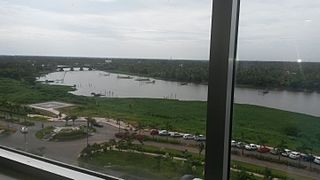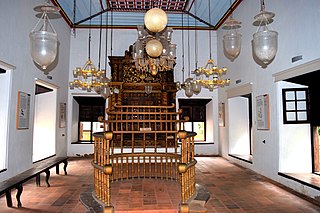
Ernakulam is one of the 14 districts in the Indian state of Kerala, and takes its name from the eponymous city division in Kochi. It is situated in the central part of the state, spans an area of about 2,924 square kilometres (1,129 sq mi), and is home to over 9% of Kerala's population. Its headquarters are located at Kakkanad. The district includes Kochi, also known as the commercial capital of Kerala, which is famous for its ancient churches, Hindu temples, synagogues and mosques.

Cochin Jews are the oldest group of Jews in India, with roots that are claimed to date back to the time of King Solomon. The Cochin Jews settled in the Kingdom of Cochin in South India, now part of the present-day state of Kerala. As early as the 12th century, mention is made of the Jews in southern India by Benjamin of Tudela.
Paliath Achan or Paliyath Achan is the name given to the male members of the Paliam royal family, a Nair/Menon chieftain family from the Indian state of Kerala who were elevated to the status of royalty by the Rajah of Kingdom of Cochin (Kerala), since the family figured prominently in the history of the region.

Kottayil Kovilakam or Kottayil Kovilakom is a small village in the Paravur taluk, Ernakulam district of Kerala state, near Kochi, south India.

Perumbavoor is a place located at the bank of Periyar in Ernakulam District in the Indian state of Kerala. It is a part of the Kochi metropolitan area. It lies in the northeastern tip of the Greater Cochin area and is also the headquarters of Kunnathunad Taluk. Perumbavoor is famed in the state for wood industries and small-scale industries. Ernakulam lies 30 km southwest of Perumbavoor. The town lies between Angamaly and Muvattupuzha on the Main Central Road (MC), which connects Thiruvananthapuram to Angamaly through the old Travancore part of Kerala.

Thrippunithura is a municipality in the Ernakulam district of Kerala, India. Thrippunithura is located about 7.1 km (4.4 mi) east of the Kochi city centre, and is a major satellite town of the city. Tripunithura being a prominent historical residential region in Kochi, was the capital of the erstwhile Kingdom of Cochin. The Hill Palace situated in Tripunithura was the palace of Maharaja of Cochin, the ruler of Kingdom of Cochin. Thrippunithura is known for its rich culture which includes the annual Vrishchikotsavam festival that takes place at the Sree Poornathrayeesa Temple.
North Paravur. formerly known as Paravur or Paravoor or Parur, is a municipality and suburb in Ernakulam district in the Indian state of Kerala. It is a northern suburb of the city of Kochi and is situated around 20 km from the city centre. It is also the first place in India to use electronic voting machine during the by-elections in 1982.

Sree Venugopla Krishna Swami Devasthan is a Hindu temple located in Chendamangalam, Kerala, India. It was established in 1900 at Chendamangalam, 42 km from Ernakulam, 22 km from Aluva and 5 km from North Paravur.
Eloor is a municipality in the Ernakulam district of Kerala, India. It is an industrial area situated around 13 kilometres north of the Kochi city centre, and is a part of the Kochi metropolitan area. It is an island of 14.21 km2 formed between two distributaries of river Periyar and is the largest industrial belt in Kerala. The neighbouring places of Eloor are Kalamassery industrial hub, Aluva, Cheranalloor and Paravur.

Cheranallur or Cheranellore or Cheranelloor is a suburb of Kochi city in the state of Kerala, India and lies on the banks of the Periyar River. According to tradition, the area was named by its earlier inhabitants who found this place very fertile and beautiful. The name in its local language Malayalam means "Good Village of Cheras".

Kadungalloor, IPA:[kɐɖuŋːɐlːuːr], is a village situated near Aluva. The village belongs to the Paravur Taluk of the Ernakulam district in the Indian state of Kerala. The industrial estates of Muppathadam and Edayar are located in Kadungalloor.

Varappuzha, IPA:[ʋɐɾɐːpːuɻɐ], is a northern suburb of the city of Kochi. It is a census town in Paravur Taluk, Ernakulam district in the Indian state of Kerala. Situated around 15 km (9 mi) from the city centre and 8 km (5 mi) from Edapally, the areas lies in the NH 66 connecting Vytilla with North Paravur. Its specialty is that considerably large-scale paddy cultivating area is situating western part of Varapuzha which is called Devaswompadam, specialised with Pokkali paddy cultivation and interim crop as fish cultivation locally called 'Kettu'. The common work of the natives are fishing and agriculture. Varapuzha is known for its fish market.
This is a list of pilgrimage centres in Ernakulam district in Kerala, India.
Paravur Taluk, IPA:[pɐrɐʋuːr], is a taluk of Ernakulam District in the Indian State of Kerala. North Paravur is the capital of the taluk. Paravur Taluk lies in the north western part of Ernakulam district bordering Thrissur district. The surrounding taluks are Kochi to the west consisting of Vypin Island, Kodungallur to the north, Chalakudy to the north consisting of Mala, Aluva to the east consisting of Angamaly, Nedumbassery and Aluva, Kanayanur to the south consisting of Cochin City. Paravur is a part of Kochi urban agglomeration area. The western parts of taluk are coastal areas with cultivations like prawn and pokkali rice. The eastern parts are fertile lands. The heavy industries of Kochi is located in Udyogmandal area of the taluk.

Kerala sari (Set-sari) is a clothing of women in the Indian state of Kerala.

Peruvanam Kuttan Marar is a chenda artist. He leads several popular traditional orchestra performances in Kerala. He received Padma Shri, India's third highest civilian award, in 2011 for his contributions in the field of art.
Parayakadu, Ernakulam is also known as Parayad or Parayakad within the Chittatukara Village Panchayat, North Paravur Paravur Taluk, Ernakulam district, Kerala, India.

The Chendamangalam Synagogue is one of the oldest known synagogues built by the Malabar Jews, in Chendamangalam, a village in the Ernakulam district of the coastal state of Kerala. It is dated to 1100 A.D., though the synagogue structure itself dates to 1420 A.D or 1614 A.D., making it the oldest synagogue in the Commonwealth of Nations. A tombstone recovered from Kodungallur was stored in this synagogue and is presently on display in the front yard. This tombstone with the inscription of Sarah Bat Israel is the oldest Jewish epitaph found in India, dating to 1269 A.D.

The Kadavumbhagham Ernakulam Synagogue in Kerala, India, is the restored oldest synagogue of the Malabar Jews with a Sefer Torah scroll and offering occasional services. It was established in 1200 CE and restored several times through the centuries on the same site. It is modeled on the earliest synagogue of the Malabar Jews at Muziris, which dated from the time of ancient sea trade between the Mediterranean and Kerala.



















